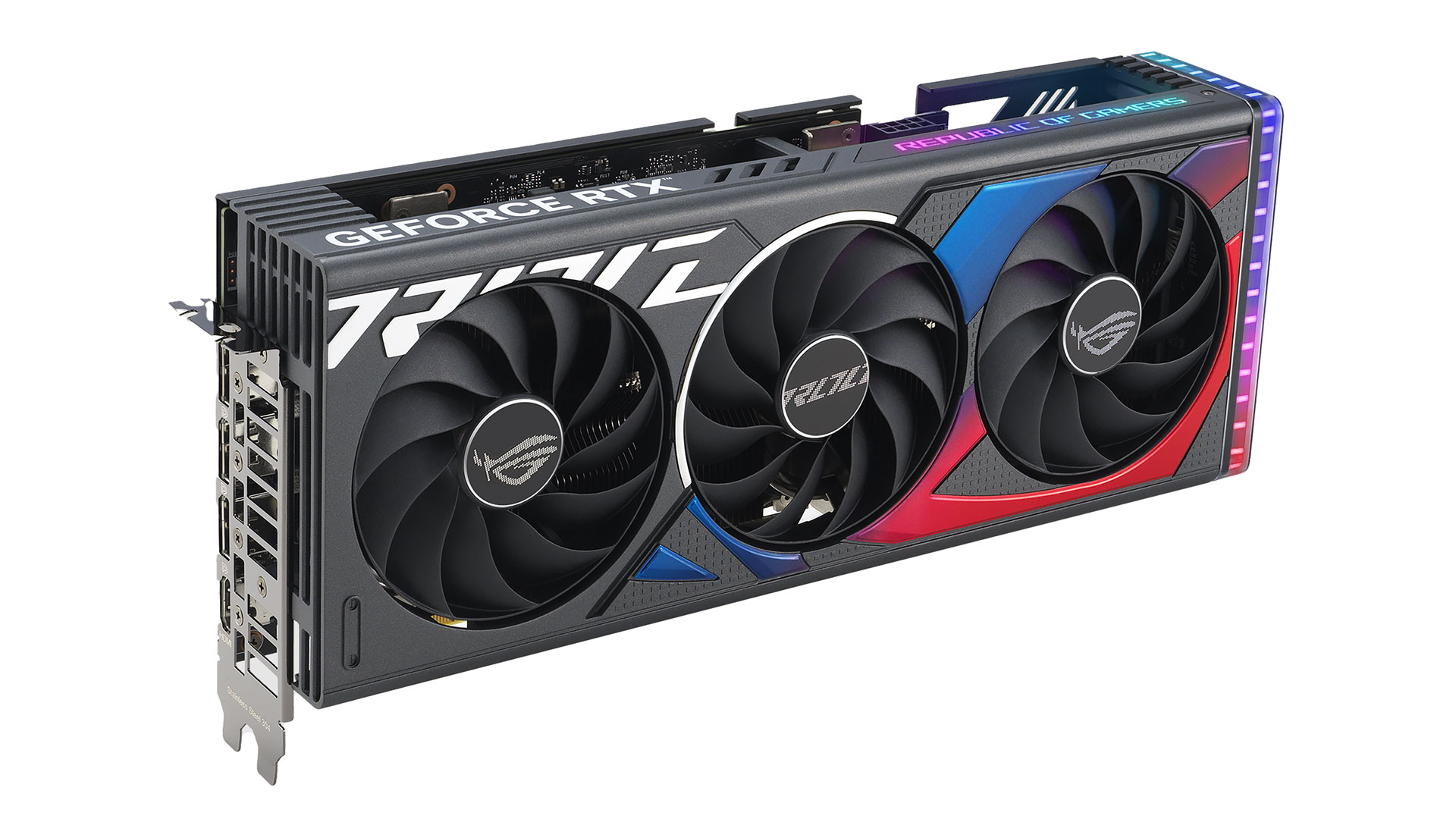
Nearly two months after launching the RTX 4060 Ti 8GB, the RTX 4060 Ti 16GB model is now available from Nvidia's add-in board (AIB) partners. Nvidia spilled the beans back in mid-May when it announced the then-upcoming RTX 4060 and 4060 Ti GPUs, detailing its own internal performance testing results. Now, independent reviewers can finally test the cards and see for themselves how much doubling the VRAM while keeping the same 128-bit memory interface helps performance.
Will the RTX 4060 Ti 16GB rank among the best graphics cards? That remains to be seen, as Nvidia isn't sampling tech sites with hardware. It's now a race to see who can get cards first to determine how it performs. Unless you want to trust Nvidia's benchmarks? If so, here are the details — these are the same slides from May when Nvidia provided a teaser of performance:
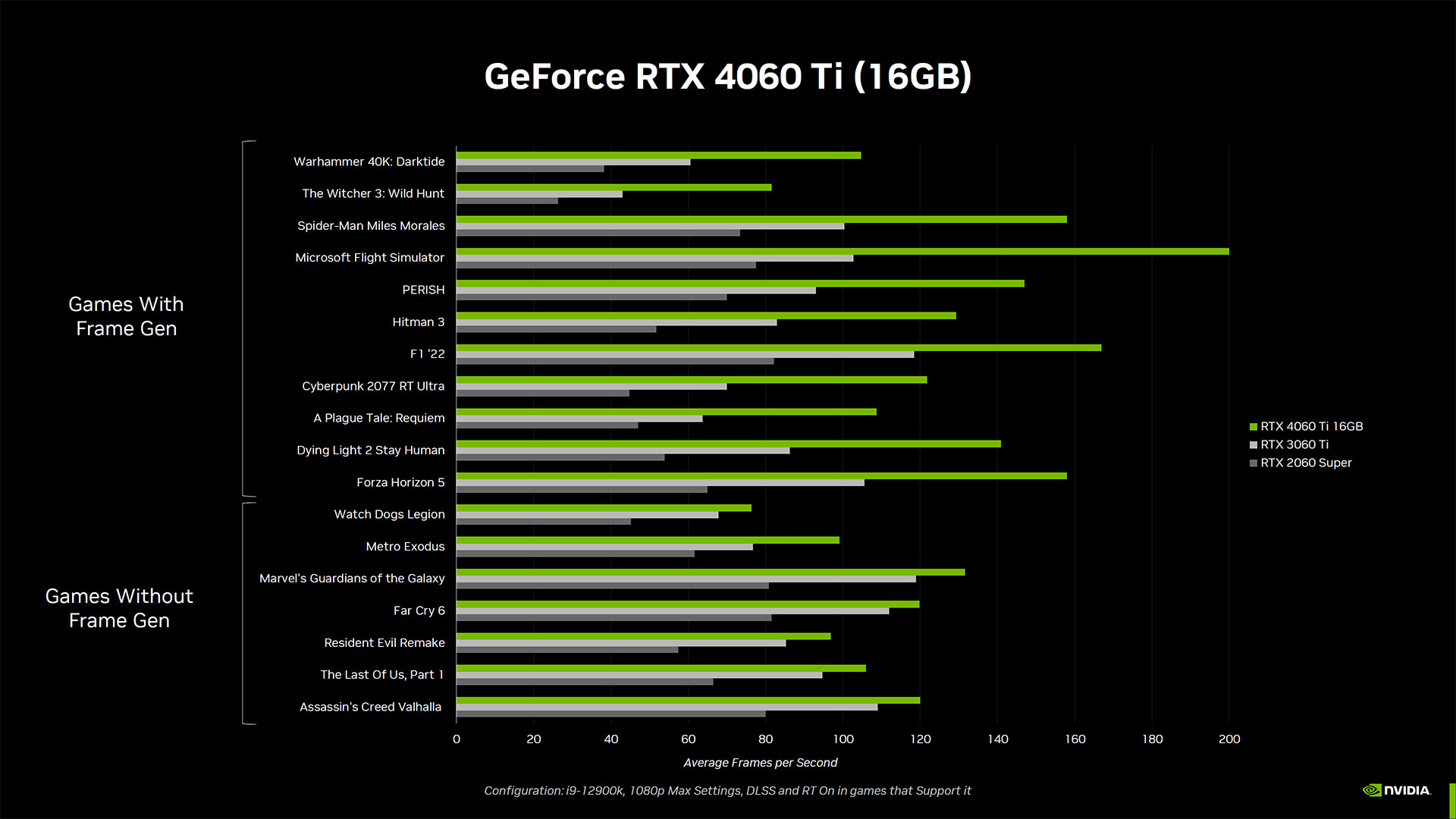
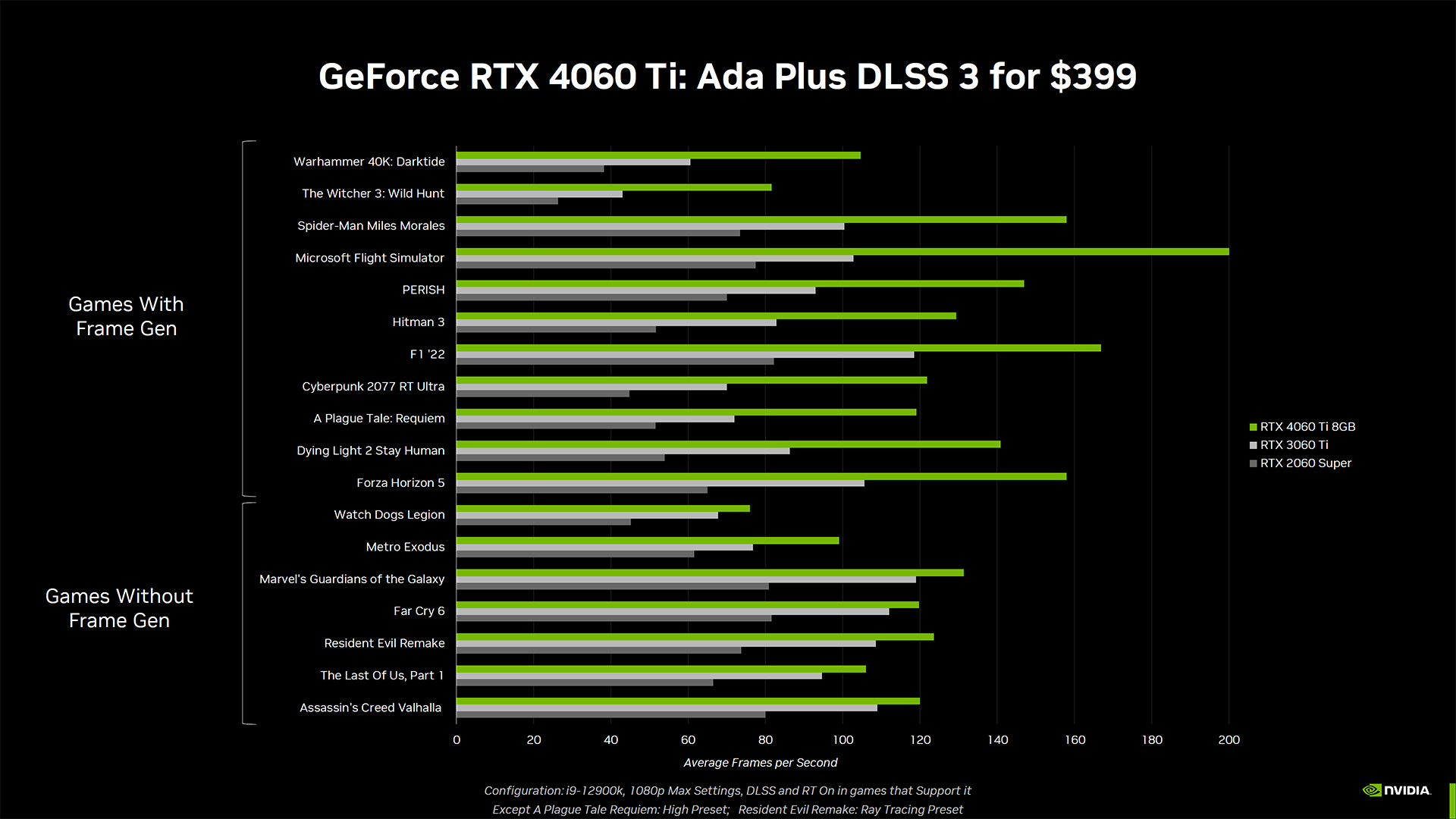
Nvidia only provided testing results at 1080p since that's the supposed target resolution — yes, even for the 16GB model! Obviously, $399 and $499 graphics cards can also run plenty of games at 1440p, and in fact, that's what Nvidia suggested as the target resolution for the RTX 3060 Ti and RTX 3070 back in 2020. Two and a half years later, roughly the same market segment in terms of price has apparently stepped down a notch on resolution.
As for the numbers, we don't have exact fps values, but it's immediately obvious that Nvidia depends on DLSS 3 Frame Generation for a big part of the "performance upgrade" — 11 of the 18 tested games support DLSS 3. The margins there look much larger than in the bottom seven games, where we see true comparable performance metrics.
Not to beat a dead horse, but Frame Generation is far more marketing than actual performance. Yes, more individual "frames" get delivered to your display, but every other frame has no new user input; plus, there's a two-frame delay (relative to the "doubled" fps), so you get higher input latency. It would be more accurately described as frame smoothing, and even then, it has limits.
Play a game with a base performance level of 30 fps, and even if Frame Generation bumps that to 60 fps, it still feels like a 30 fps game. Or worse yet, a game running at 20 fps and then doubled to 40 fps via Frame Generation would still feel like 20 fps. You basically want 40 fps or more as the non-Framegen framerate for it to feel okay, at least in my experience.
Back to the performance charts, everything is identical between the 8GB and 16GB cards (which seems a bit suspect), except for A Plague Tale: Requiem and Resident Evil Remake, both of which used the "high" preset on the 8GB card. Is the 16GB card faster than the 8GB card? Probably in plenty of cases, but we couldn't say for certain by how much. Since these games aren't all titles that we test, and even the ones that we do test might be using different test sequences, Nvidia's preview charts don't fully put the 4060 Ti 16B performance into context.
Here's a rehash of the specifications for Nvidia's new 4060 and 4060 Ti, compared to the previous generation 3060 and 3060 Ti. Again, the only difference between the two 4060 Ti models is that the 16GB card doubles the amount of VRAM. Compute, bus width (128-bit), PCIe interface width (x8), power, and everything else remain unchanged.
Of course, there's no Founders Edition for the 16GB card, so we may not see much in the way of stock-clocked cards for the graphics card manufacturers. Unless Nvidia requires its partners to offer reference models (which we doubt it will), most might come with a modest factory overclock. We'll also have to see how much the cards actually end up costing at retail.
The other question is how performance will match up against AMD's competing GPUs. We've seen the 4060 Ti 8GB, and it's... well, it depends on what sort of games you test with. It's roughly on par with the RX 6750 XT in many rasterization games. That card has 50% more memory and currently costs around $360, though we saw it for as little as $320 during Prime Day sales. But in demanding ray tracing games (meaning multiple RT effects), the 4060 Ti competes with the 6800 XT — even though it has half as much memory.
Ray tracing does tend to use more memory than rasterization, so we could see the RTX 4060 Ti 16GB improve by 5–10 percent on average compared to the 8GB version in that sort of testing. On the other hand, older games that were designed two or three years ago and don't really need more than 8GB will likely see very little benefit.
Unfortunately, we don't have a card yet, so we can't do our own testing. There's been some frustration on the part of various tech sites/videos about the lack of cards being sampled to reviewers. It's worth noting that this isn't the first time Nvidia hasn't directly sampled press and influencers. The RTX 3090 Ti wasn't sampled, nor were the RTX 3080 12GB and GTX 1630. Other GPUs in the past have appeared without having the full launch treatment as well, things like the RTX 2060 12GB or GTX 1060 5GB.
What these GPUs all generally have in common is that they're not perceived as being marquee releases. They're less important launches, often of hardware that might not get too favorable of a reception from reviewers. And it's a safe bet that, after the angry hot takes leveled at the RTX 4060 Ti and RTX 4060, there are plenty of critics that won't like the RTX 4060 Ti 16GB.
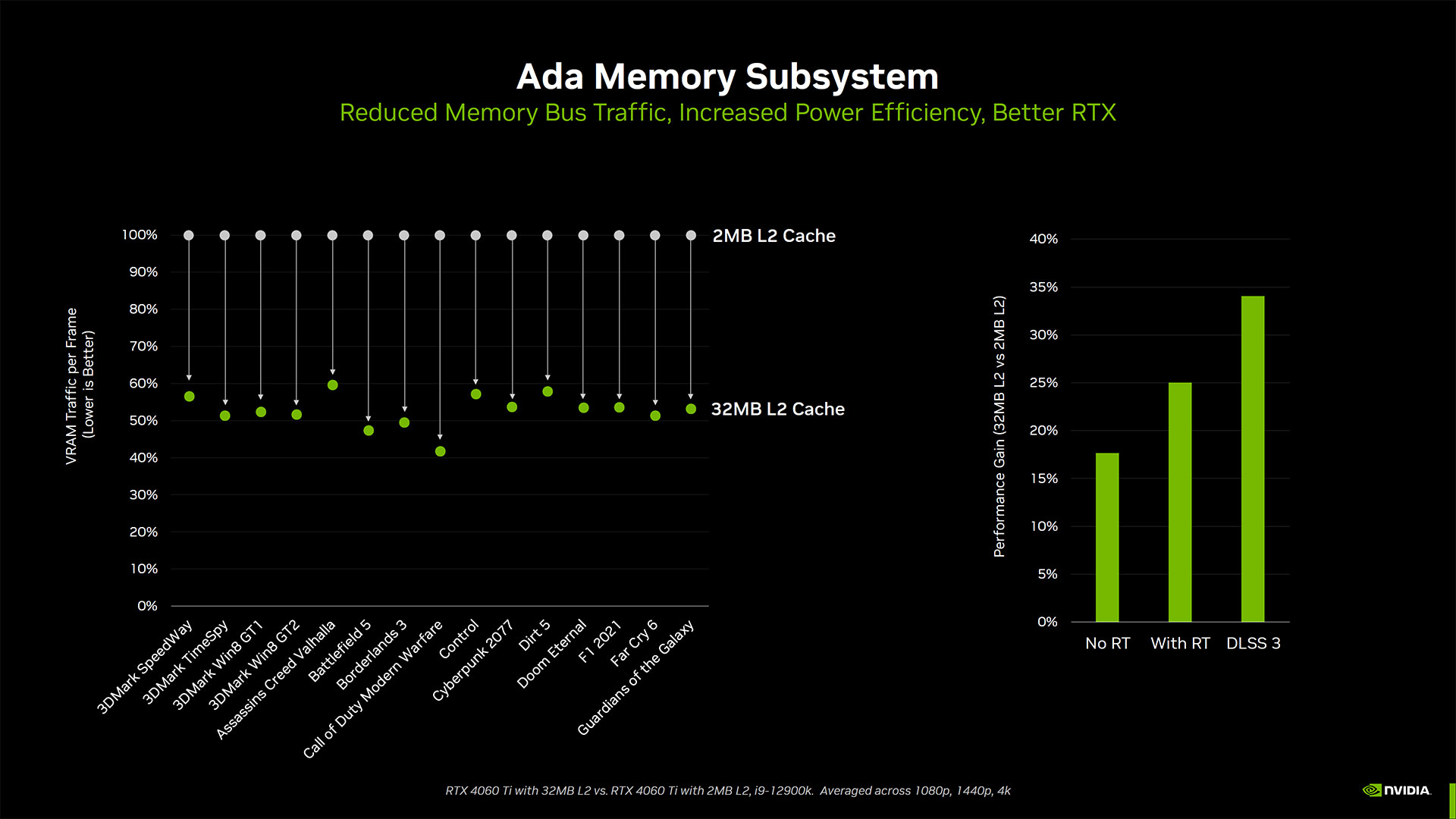
The biggest problem will be the memory interface. Sticking two 2GB chips on each 32-bit channel gets over the 8GB capacity problem and then some, but the GPU still has a 32MB L2 cache and, according to Nvidia, effective bandwidth of 544 GBps — and 288 GBps of direct bandwidth. The RTX 3060 Ti, by comparison, had 448 GBps of bandwidth, and it didn't depend on a large L2 to get there. This means that, at 1440p and 4K, the L2 cache advantage of the 4060 Ti will be diminished.
Nvidia provided the above sampling of its internal testing of an RTX 4060 Ti with a 2MB L2 cache versus the 32MB L2 cache that it actually uses — that's the same size L2 cache as the previous generation part. While it's true that the larger L2 helps mitigate memory bandwidth constraints, Nvidia's own figures suggest the L2 improves performance by around 18 to 25 percent (not including DLSS 3).
That's a decent boost, but the benefits vary by game, and having more VRAM potentially means the L2 cache won't be as effective in games that actually use the additional memory. We'll have to do our own testing before drawing any firm conclusions, but there's certainly reason to be concerned.
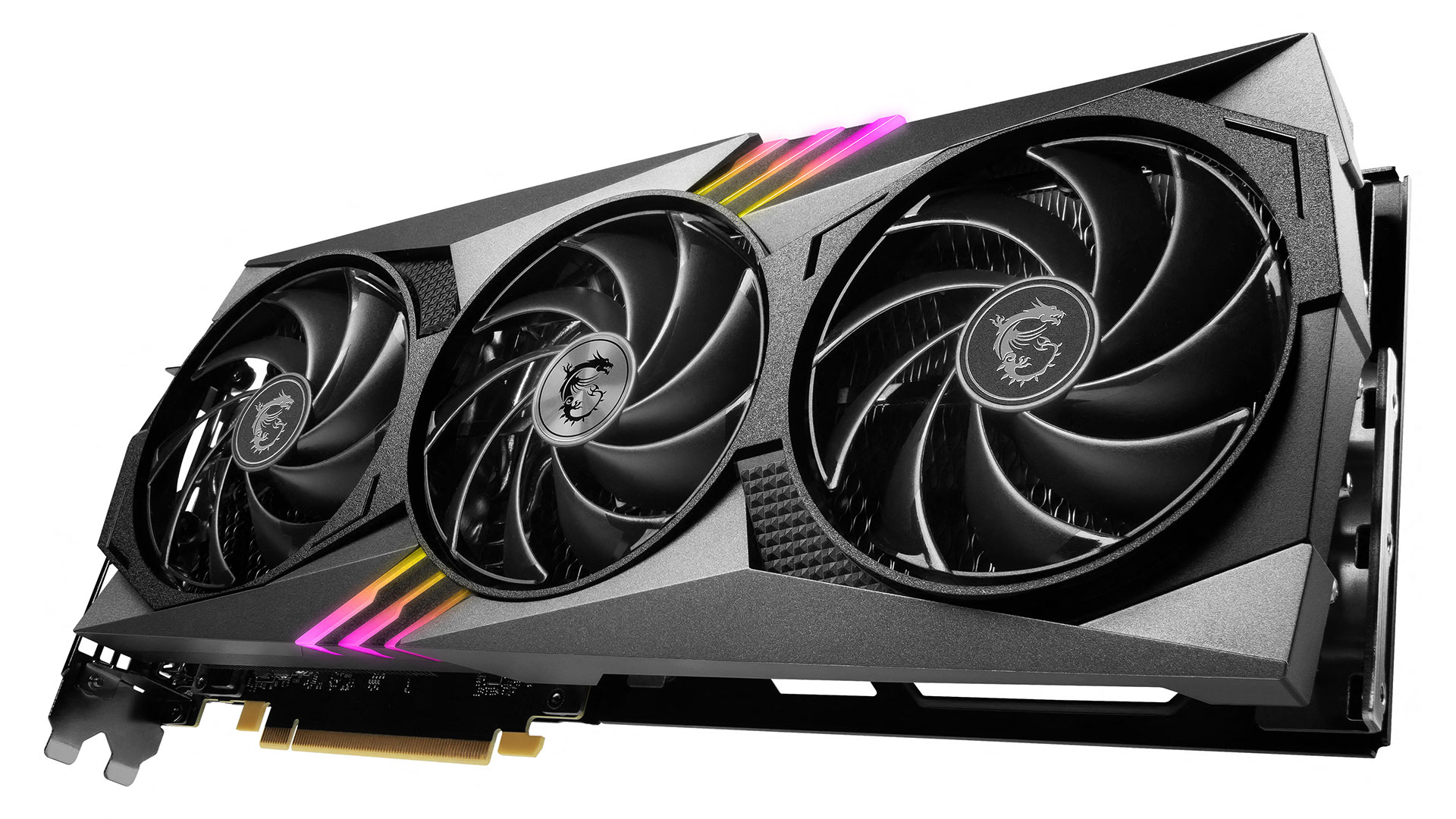
Besides the 128-bit interface, the RTX 4060 Ti 16GB has another problem: Pricing. People have been understandably upset about the generational price hikes going on with the RTX 40-series. Yes, a chip made on TSMC's 4N process node will cost more than an equivalently sized chip made on Samsung's 8N node, but the new chips aren't actually the same size.
The RTX 3060 Ti used GA104 with a 392.5mm^2 die. The RTX 4060 Ti uses AD106 with a 187.8mm^2 die. In other words, the new generation chip is less than half as large as the previous generation chip. It also has the same amount of VRAM for the 8GB card (and prices have likely dropped over the past 2.5 years), while the 16GB model obviously doubles the capacity. But now, with 16GB, it's priced the same as the previous generation RTX 3070, which in our testing of the 4060 Ti 8GB was basically tied in performance.
Put another way, the Intel Arc A770 16GB costs $319 right now. That's the same memory capacity, and Intel charges about $50 extra to go from 8GB to 16GB. That Nvidia wants to double the price and charge $100 extra for the same change in capacity isn't going to win friends and influence people.
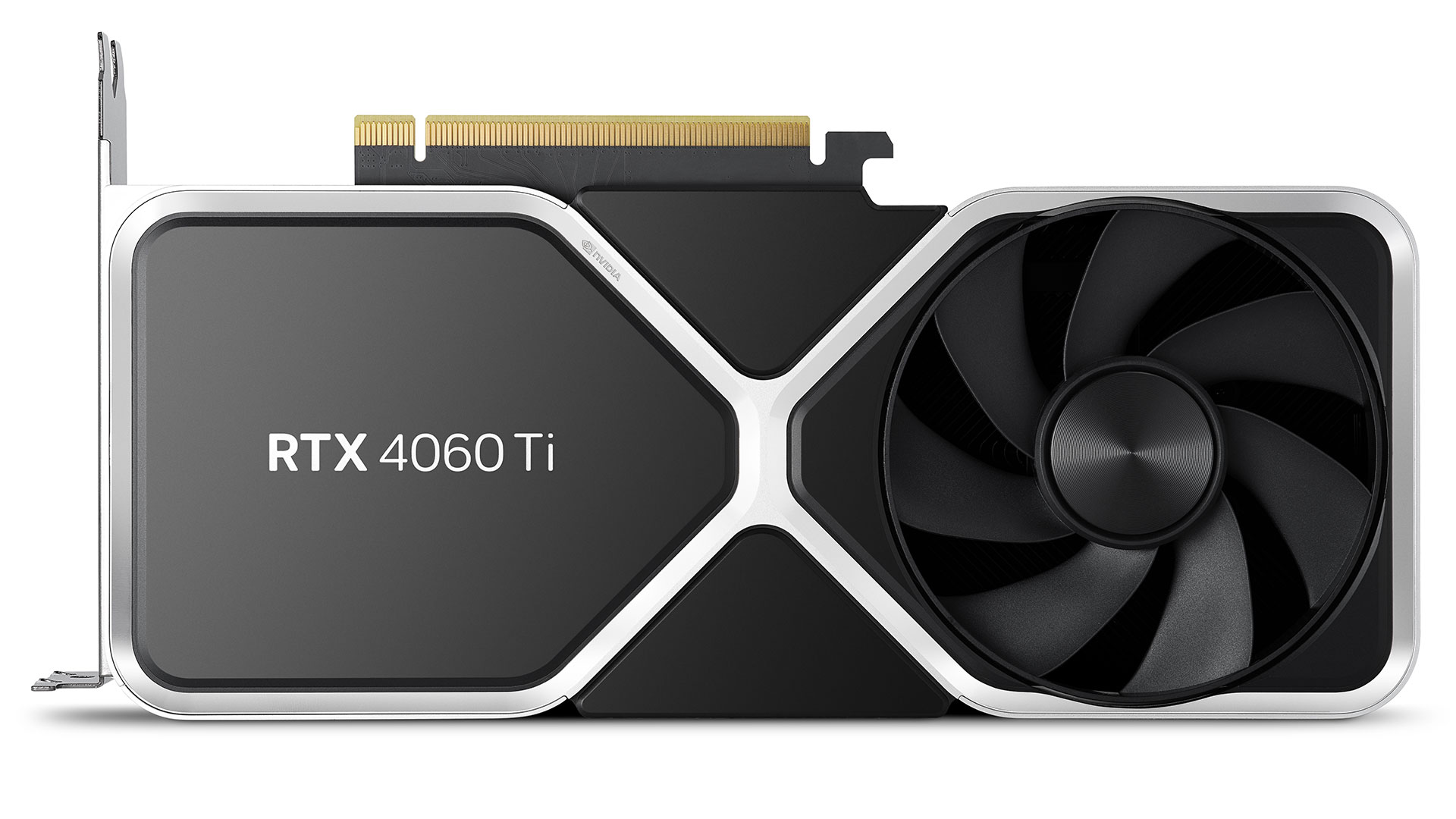
We're working on acquiring a card for review, so we'll have testing results in the coming days. In the meantime, perhaps as an even better indication of what to expect from the RTX 4060 Ti 16GB, none of the Nvidia AIB partners we reached out to had plans to sample their 16GB models either. And as another point to consider, Nvidia itself isn't making a Founders Edition of the 16GB card. Why send out cards for review if the press and influencers are just going to beat up on them?
My hunch is that performance for the 16GB model will be "okay," and there will certainly be games where the extra memory helps out. But you know what would also help? More compute performance and more memory bandwidth. The RTX 4070 costs $599, so if you're willing to pay $100 extra to go from the 8GB model to the 16GB model of the 4060 Ti, we can't help but think the RTX 4070 would warrant spending another $100.
Yes, that's now $200 more than the 4060 Ti 8GB, and it's less VRAM than the 16GB model. However, in our current tests, the 4070 performs about 35% better than the 4060 Ti 8GB. It can legitimately handle 1440p gaming, and even 4K with DLSS upscaling. The 4060 Ti, even with 16GB, will still be primarily a 1080p gaming solution, thanks to the narrow bus width.
Fundamentally, doubling the VRAM doesn't address our biggest concerns with the RTX 4060 Ti. When people complained about Nvidia being skimpy with memory, it wasn't just about capacity. What we really wanted was for the RTX 4060-class GPUs to have a 192-bit interface with 12GB of VRAM, and for the 4070-class cards to have a 256-bit interface with 16GB of VRAM — you know, like AMD did with its previous generation RX 6000-series cards, and like it's working toward with the RX 7000-series. That Nvidia also wants to charge $100 extra for the 16GB card only makes things worse.
Anyway, check back in the next day or two, and we'll see how the RTX 4060 Ti 16GB fares in our GPU benchmarks. Most likely, it will only be a few percent faster than the 8GB card overall, with a few edge cases where VRAM use goes well past 8GB and the gap ends up larger.







